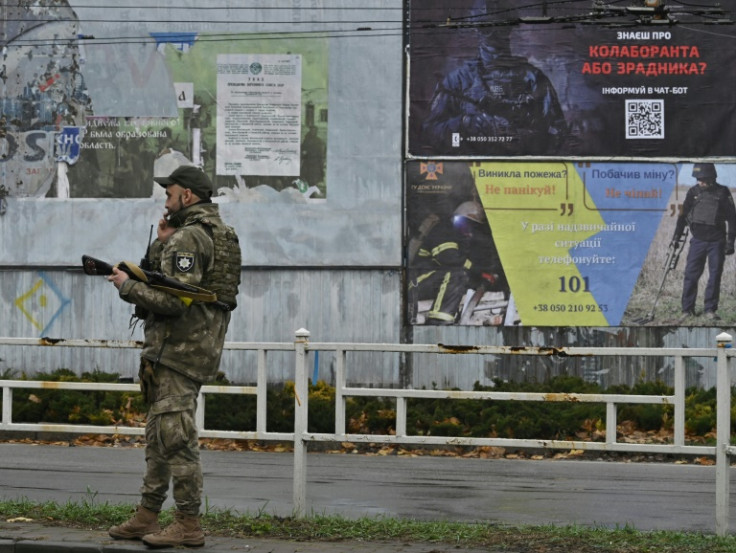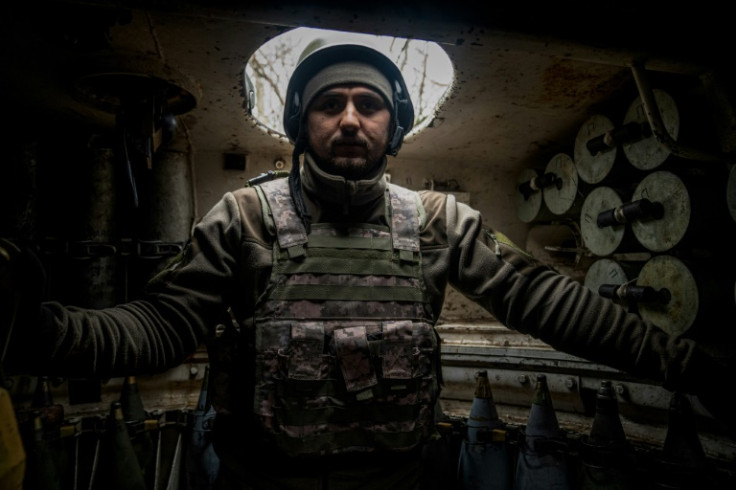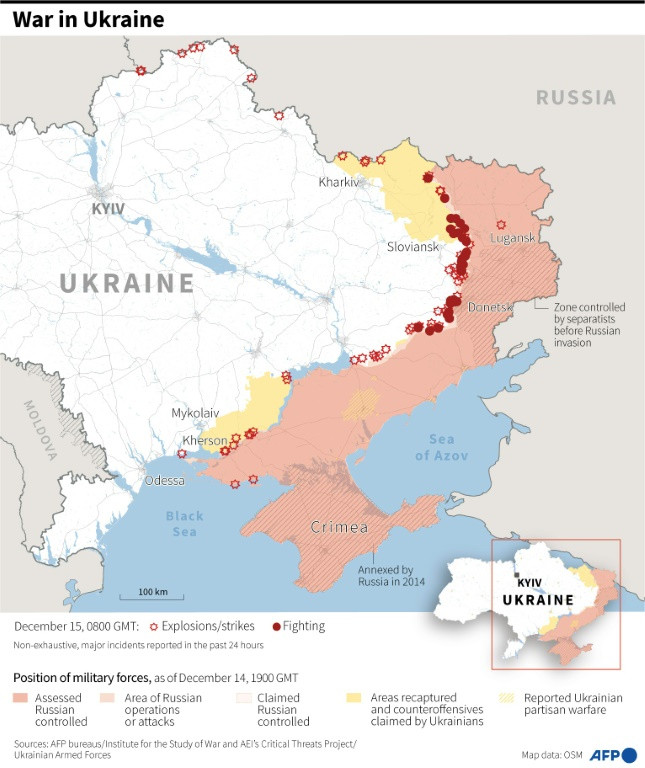Deadly Russian Shelling Cuts Off Kherson Power

Russian shelling killed two people including a Red Cross worker in Kherson on Thursday and completely cut power in the southern city, Ukrainian officials said, with temperatures near freezing.
Moscow-allied officials in the Russian-occupied city of Donetsk, meanwhile said they had come under some of the heaviest shelling in years from Ukrainian forces, leaving one person dead.
The UN's human rights chief also set out evidence of what he said was Russian killings of hundreds of Ukrainian civilians in the first months of the war.
Despite Russia's humiliating retreat from Kherson in November, the city remains within the reach of Moscow's weaponry and under constant threat.
The city was left "completely without power" after a series of strikes, regional governor Yaroslav Yanushevych said.
Mirjana Spoljaric, head of the International Committee of the Red Cross, said a worker with the Ukrainian Red Cross was one of those killed.
"Red Cross works close to the frontlines helping people wounded and those no longer taking part in hostilities," she wrote on Twitter.
"It is imperative that its personnel and property are spared."
UN rights chief Volker Turk said his office had documented the summary executions and direct killings of 441 civilians across just three regions of Ukraine from the start of Russia's invasion on February 24 until April 6.
The "actual figures are likely to be considerably higher" he said, adding "there are strong indications that the executions... may constitute the war crime of wilful killing."
Beyond that initial period, Turk said his team had continued to document gross rights violations affecting both civilians and combatants, including arbitrary detention, enforced disappearances, torture and sexual violence.
So far, he added, "accountability remains sorely lacking."
Intense fighting continued along the front lines in the east, especially in the Bakhmut area targeted for capture by Russian forces in October.
Much of Ukraine continues to struggle with power supplies after the Russian air campaign targeted electricity and water systems starting nearly two months ago.
Ukraine's commander-in-chief General Valeriy Zaluzhny told British weekly The Economist they expected a fresh Russian assault on Kyiv in the early months of 2023.
Kyiv was the primary target when the Russians first invaded on February 24, but their northern campaign, launched from Belarus, was rebuffed by a gritty Ukrainian counter-offensive that preserved the seat of government.
"The Russians are preparing some 200,000 fresh troops. I have no doubt they will have another go at Kyiv," Zaluzhny said.
Russia has appeared to pump up its presence anew in Belarus in recent weeks, according to US-based conflict monitor, the Institute for the Study of War.
But it said exercises and deployments do not likely indicate plans by Belarus forces themselves to attack northern Ukraine.
Instead, the actions "are likely part of ongoing Russian information operations" to keep Kyiv nervous and forced to maintain significant force levels in the north, far from the active front lines, according to ISW.
Having retreated from parts of southern Ukraine, Moscow's forces were engaged in fierce battles in the east, particularly in the Donetsk region.
The region has been partly controlled by Moscow-backed separatists since 2014.
On Thursday, local Russia-aligned authorities reported "the most massive shelling since 2014" in the regional capital, Donetsk city.
At least one person was killed and nine more injured in the strikes, they said.
In Donetsk, "the epicentre of the fighting remains the Bakhmut and Avdiivka directions," Ukraine deputy defence minister Ganna Malyar told a briefing.
"The enemy is hard to beat," Petro, a Ukrainian military unit chief in the area, told AFP.
"Staying on the frontline is very difficult. They sustain heavy losses, but so do we."
In Washington the Pentagon announced it will expand training for Ukrainian forces in Germany to about 500 persons per month focused on larger-scale maneuvers and specific weapons systems.
The new effort will "include joint maneuver and combined arms operations training, while building upon the specialized equipment training that we're already providing," Pentagon Press Secretary Pat Ryder said.
Ryder would not confirm expectations that the United States will provide advanced Patriot air defense batteries to Ukraine, which would bring added protection against Russian cruise missiles as well as tactical ballistic missiles Moscow is believed seeking from Iran.
The European Union also cleared the way to giving Ukraine another 18 billion euros ($19 billion) in aid following an impassioned plea from Ukraine President Volodymyr Zelensky.



© Copyright AFP 2025. All rights reserved.




















